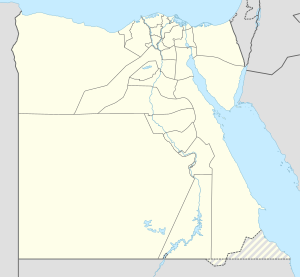
Back الغزو الفاطمي لمصر Arabic Conquesta fatimita d'Egipte Catalan Conquista fatimí de Egipto Spanish Penaklukan Mesir oleh Fatimiyah ID Conquista fatimide dell'Egitto Italian ファーティマ朝のエジプト征服 Japanese Фатимидское завоевание Египта Russian 法蒂玛征服埃及 Chinese
| Fatimid conquest of Egypt | |||||||
|---|---|---|---|---|---|---|---|
| Part of the Fatimid Caliphate's expansion | |||||||
| |||||||
| Belligerents | |||||||
| Fatimid Caliphate | Ikhshidid dynasty | ||||||
| Commanders and leaders | |||||||
Location of Fustat in Egypt | |||||||
The Fatimid conquest of Egypt took place in 969 when the troops of the Fatimid Caliphate under the general Jawhar captured Egypt, then ruled by the autonomous Ikhshidid dynasty in the name of the Abbasid Caliphate.
The Fatimids launched repeated invasions of Egypt soon after coming to power in Ifriqiya (modern Tunisia and eastern Algeria) in 909, but failed against the still-strong Abbasid Caliphate. By the 960s, however, while the Fatimids had consolidated their rule and grown stronger, the Abbasid Caliphate had collapsed, and the Ikhshidid regime was facing prolonged crisis: foreign raids and a severe famine were compounded by the death in 968 of the strongman Abu al-Misk Kafur. The resulting power vacuum led to open infighting among the various factions in Fustat, the capital of Egypt. The atmosphere of crisis was deepened by the simultaneous advances of the Byzantine Empire against the Muslim states of the Eastern Mediterranean. Meanwhile, Fatimid agents operated openly in Egypt, and the local elites increasingly came to accept and even welcome the prospect of a Fatimid takeover in hopes of ending the instability and insecurity.
Faced with this favourable situation, the Fatimid caliph al-Mu'izz li-Din Allah organized a large expedition to conquer Egypt. Led by Jawhar, the expedition set off from Raqqada in Ifriqiya on 6 February 969, and entered the Nile Delta two months later. The Ikhshidid elites preferred to negotiate a peaceful surrender, and Jawhar issued a writ of safe-conduct (amān), promising to respect the rights of the Egyptian notables and populace and take up the jihād against the Byzantines. The Fatimid army overcame the attempts of the Ikhshidid soldiery to prevent its crossing of the Nile river between 29 June and 3 July, while in the chaos pro-Fatimid agents took control of Fustat and declared its submission to al-Mu'izz. Jawhar renewed his amān and took possession of the city on 6 July, with the Friday prayer read in the name of al-Mu'izz on 9 July.
For the next four years Jawhar served as viceroy of Egypt, quelling rebellions and beginning the construction of a new capital, Cairo. His attempts to expand into the former Ikhshidid domains in Syria, and even attack the Byzantines, backfired: after swift initial progress, the Fatimid armies were destroyed, and Egypt itself faced a Qarmatian invasion that was fought off just north of Cairo. Al-Mu'izz arrived in Egypt in 973, and took up residence in Cairo, which became the seat of the Fatimid Caliphate for the remainder of its existence, until the abolition of the Fatimid regime by Saladin in 1171.
